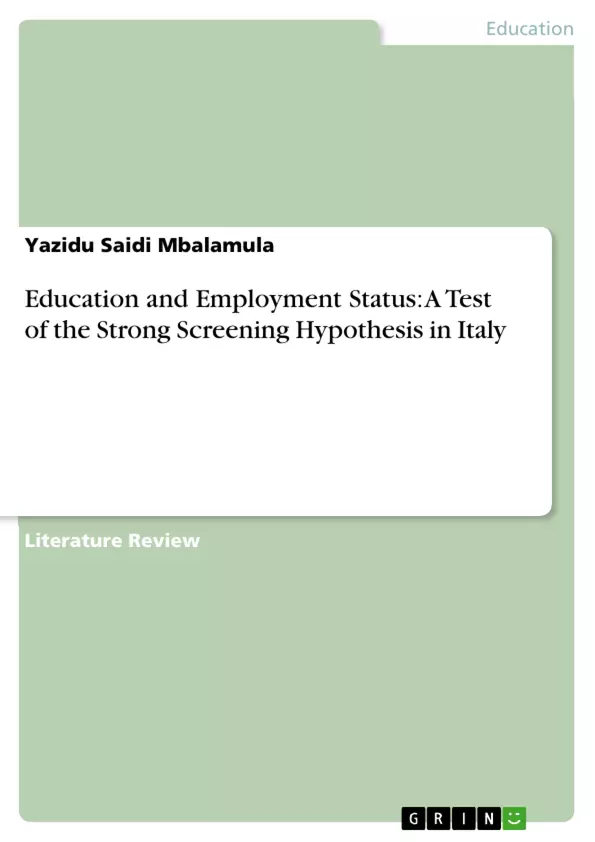The study presented in the article was comparatively intended to investigate the relationship of two key independent variables, Education level (i.e. low, intermediate, high and degree) as related to Employment status (i.e. public, private of self employment) on individual earnings. The Human Capital Theory is adopted to contextualize theoretical base of the relationship between the variables.
The theory is further inclined to two strands of Screening hypothesis, Strong Screening Hypothesis (SSH) and Weak Screening Hypothesis (WSH) which in respect contrast, SSH presumes productivity is immutable with schooling used exclusively as a signal, while WSH concedes that not only that primary role of education is to signal, but also it augments inherent productivity. The two opposing theses expand the possibilities beyond Human Capital theorizations.
The study collected data from sample of 1169 individuals (853 employed and 316 self-employed) as derived from Banca d’Italia survey data of 1989 and questionnaires. Two sample selection methods were adopted from Wolpin (1977) and Psacharopoulos (1979), and Bivariate and Multivariate selection methods were employed to control bias on the two resulting dependent variable categories, that is, all employees and self-employed category; and private, public and self employed category. In the same vein, the authors adopted Heckman (1979) bivariate and Lee (1983) sample selection approaches.
Inhaltsverzeichnis (Table of Contents)
- Introduction to Key terms and Concepts
- Human Capital Theory
- Screening Hypothesis
- Employment
- Public Employment
- Private Employment
- Self Employment
- Statistical Tests Used
- Mean
- Standard Deviation
- T-test
- F-test
- Chi-Square
- Summary of the Article/Study
- Research Design
- Discussion
- Strength (s)
- Critic (s)
- Recommendations
- Relevancy in Education Settings
Zielsetzung und Themenschwerpunkte (Objectives and Key Themes)
This study aims to investigate the relationship between education level and employment status on individual earnings in Italy, utilizing the Human Capital Theory and its extensions, the Strong Screening Hypothesis (SSH) and Weak Screening Hypothesis (WSH). The study examines the impact of different levels of education on earnings in both public, private, and self-employment sectors. It explores how education acts as a signal of pre-existing ability and whether it also contributes to enhanced productivity.
- The impact of education levels (low, intermediate, high, and degree) on earnings in various employment sectors (public, private, and self-employment).
- The application of the Human Capital Theory, SSH, and WSH to understand the relationship between education and earnings in Italy.
- The role of education as a signal of ability versus a factor contributing to increased productivity.
- The comparison of earnings between employed and self-employed individuals based on education level.
- The analysis of the effect of education on earnings in different sectors, highlighting potential differences between public, private, and self-employment.
Zusammenfassung der Kapitel (Chapter Summaries)
The study begins by defining key terms, including Human Capital Theory, Screening Hypothesis, various types of employment, and statistical tests used in the analysis. It then proceeds to summarize the study's methodology and research design, which utilized both quantitative and qualitative methods. The quantitative analysis employed statistical tests to determine the relationship between education levels and employment status on earnings.
The chapter on research design explores the specific methods used to collect data, such as surveys and questionnaires. The authors also discuss the statistical analyses used to control for bias and examine the effects of education and employment status on earnings. The discussion section highlights the strengths and weaknesses of the study, emphasizing the use of the Mincerian regression analysis for estimating earnings, the blending of bivariate and multivariate methods for addressing potential confounding variables, and the ethical considerations taken in data collection and analysis. The study acknowledges limitations, such as the reliance on a specific dataset and the potential for unmeasured factors influencing earnings.
Schlüsselwörter (Keywords)
The study focuses on the relationship between education and employment status, particularly in the context of Italian labor market dynamics. It investigates the Human Capital Theory, the Strong Screening Hypothesis, and the Weak Screening Hypothesis, examining how these theoretical frameworks relate to earnings differentials based on education levels and employment sectors. The study employs statistical analysis methods such as mean, standard deviation, t-test, f-test, and chi-square to examine the data, highlighting the impact of education on individual earnings in public, private, and self-employment sectors in Italy. The keywords include: human capital theory, screening hypothesis, education, employment, earnings, public employment, private employment, self-employment, statistical analysis, Mincerian regression analysis, Italy, and labor market.
Frequently Asked Questions
What is the main objective of the study on education and employment in Italy?
The study investigates how education levels and employment status (public, private, or self-employment) affect individual earnings in the Italian labor market.
What is the difference between the Strong Screening Hypothesis (SSH) and the Weak Screening Hypothesis (WSH)?
SSH assumes education is purely a signal of pre-existing ability, while WSH suggests that education both signals ability and increases an individual's productivity.
Which theoretical framework is used in this research?
The study is primarily based on the Human Capital Theory, along with its extensions into screening hypotheses.
What data sources were used for the analysis?
The authors utilized survey data from the Banca d’Italia (1989) covering a sample of 1,169 individuals, including both employees and self-employed persons.
Which statistical methods were applied to estimate earnings?
The study employed Mincerian regression analysis, along with Heckman and Lee sample selection approaches to control for bias.
- Citar trabajo
- Yazidu Saidi Mbalamula (Autor), 2014, Education and Employment Status: A Test of the Strong Screening Hypothesis in Italy, Múnich, GRIN Verlag, https://www.grin.com/document/271538



